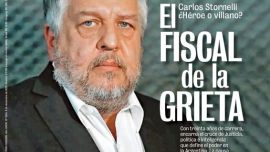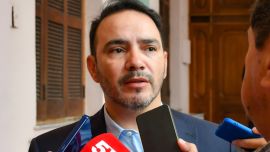Agustín Salvia, the director of the influential Observatorio de la Deuda Social of the Universidad Católica Argentina (Social Debt Observatory of the Catholic University of Argentina, UCA), warned Tuesday that poverty could increase to "39 or 40 percent" of the population by the end of the year.
"The current dynamic is of increasing inflation and deepening stagnation. Hopefully the situation will stabilise soon because, if not, we will reach 39 or 40 percent by the end of the year," the academic told the Radio Con Vos radio station in an interview.
The poverty expert was speaking in the wake of new data published on Monday from the INDEC national statistics bureau that showed that 35.4 percent of Argentines are now considered poor. Up more than three points over a six-month period, the figure is the highest officially recorded since 2001. It stood at 27.3 percent one year ago. Extreme poverty rose to 7.7 percent, up from 4,9 percent 12 months previous.
"The data is obvious and expected," said Salvia, adding that since last year, there has been "a systematic increase in stagflation, devaluations, inflationary impact, adjustment policies and greater recession."
Argentina is currently gripped by recession, with the peso having dropped by more than 20 percent against the dollar since the August 11 PASO primaries, in which President Mauricio Macri's hopes of winning re-election took a hit. Opposition Peronist challenger Alberto Fernández, leading the Frente de Todos coalition, emerged with a lead of more than 16 points over the Juntos por el Cambio leader.
Salvia warned the worst was yet to come and said more had to be done to help the most vulnerable sectors of society.
"The rate announced yesterday is not surprising, unfortunately," he added in a separate interview with Radio La Red. "We come from that trend and the recent devaluation and stagnation will generate a new increase in poverty, which will be close to 37 or 38 percent at this time and will reach 39 at the end of the year."
Poverty will rise, he warned, because "there is no horizon of growth."
"Today, assistance policies are insufficient in order to get people out of homelessness. It will take much more than the food emergency [law]," he added.
'Resounding failure'
Speaking Tuesday, Buenos Aires Province deputy Lisandro Bonelli, of Sergio Massa's Frente Renovador ("Renewal Front"), criticised the government for failing to tackle poverty.
"In 2015 President Mauricio Macri promised zero poverty, but four years later, 35.4 percent of Argentines are poor," she said, referring to the INDEC data.
In a statement, the lawmaker referenced President Mauricio Macri's 2015 campaign promise that the success of his government should be judged on the evolution of the poverty rate.
"The president said that we should judge him on whether or not he would reduce poverty. That is why we must say today that what he has done has been a resounding failure and that he now leaves us with a country immersed in a deep economic and social crisis."
During a visit to Tucumán, Cabinet chief Marcos Peña responded to INDEC's report by describing poverty as "a painful issue that we have not resolved for many years in Argentina."
He called on Argentina's political leadership "to act with greatness to find a solution to the trouble."
"It is not the time to start throwing political attacks," he added.
Macri's vice-presidential running mate, Miguel Ángel Pichetto said Tuesday that poverty was a "structural" problem that had harmed Argentina since the 1960s and 1970s. Neither "democracy" nor "dictatorship" had "responded" to the issue, he argued.
"Today we are in the worst of all the worlds," he said, going on to argue that "75 percent of [Argentina's] total budget is social security spending," a state of affairs he described as "not feasible."
"Poverty is a structured reality that has always been around 30 percent, it is one of the system's shortcomings. Argentina is an emerging developing country that has failed to develop an industrial model capable of generating employment over time" he told the Continental radio station.
Pichetto, a Peronist, was critical of social welfare spending, saying they "cannot be forever." He also claimed that "400,000 Venezuelans have entered the country in the last year and have gotten jobs."
– TIMES/TÉLAM/PERFIL


























Comments